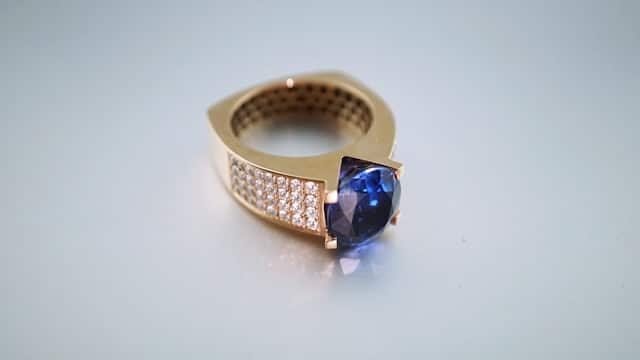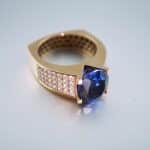In the era of conscious consumerism, more and more of you are seeking ethically-sourced gemstone rings that can be worn with pride and confidence. Whether it’s for an engagement, a special occasion, or simply to add sparkle to your workday outfit, choosing a ring that aligns with your values is a fulfilling process. This guide will delve deep into the world of ethical jewelry, providing you insights into sustainable mining practices, recycled gold, lab-grown diamonds, and fair trade principles. By the end of it, you’ll have a solid understanding of how to choose a statement-making, yet office suitable ring that is also kind to our planet.
Understanding Ethical Jewelry
Let’s start from the very beginning: what does it mean for a piece of jewelry to be ‘ethical’? Essentially, it refers to jewelry that has been sourced and crafted in a manner that respects the environment, human rights, and fair trade practices. This means that the mining of gemstones and gold, and the labor behind the craft are all held to high standards of sustainability and fairness.
A lire aussi : What’s the Ideal Way to Wear a Cashmere Poncho for a Polished Yet Cozy Office Look?
For many years, the jewelry industry has been tainted by unethical practices, from diamond mining causing environmental degradation, to exploited labor in gemstone cutting and polishing workshops. However, with the rise of conscious consumers, many jewellers are now committed to sourcing their materials from ethical, sustainable sources.
It is important to ask questions about the origin of your jewelry. Look out for jewels that are certified by Fairmined or Fairtrade labels, which guarantee that the mines adhere to strict environmental and social standards. Furthermore, some brands offer a detailed ‘traceability’ report that tells the story of where your gemstone has come from.
Dans le meme genre : How Can You Integrate a Vintage Brooch Collection into a Modern Work Wardrobe?
Choosing Sustainable Gemstones
When it comes to gemstones, ‘sustainable’ is a term that encompasses several factors. Ideally, a sustainable gemstone is one that has been mined with minimal impact on the environment, and has provided fair wages and safe working conditions for the miners.
Lab-grown gemstones are an increasingly popular choice for those seeking sustainable alternatives. These stones are grown in controlled environments, using less water and energy compared to traditional mining. They also eliminate the risk of human rights violations associated with some mining practices. Lab-grown gemstones can be identical to their mined counterparts in terms of their physical, chemical, and optical properties, so you don’t have to sacrifice quality or beauty for sustainability.
Another option is to choose gemstones that have been mined using ecological restoration techniques. These practices involve returning the mined land to its natural state after the gemstones have been extracted, thus minimizing environmental damage.
Opting for Recycled Gold
Gold is another key component in rings. However, gold mining is often associated with severe environmental harm and social injustice. The good news? Recycled gold offers a more sustainable and ethical alternative.
Recycled gold is sourced from used jewelry, electronic waste, or dental materials, rather than mined from the earth. This process significantly reduces the demand for new gold mining and the associated environmental and social harms.
Choosing a ring made from recycled gold does not mean compromising on quality or aesthetics. In fact, recycled gold can be refined and reworked into a new piece of jewelry that’s as beautiful and durable as one made from newly mined gold.
Embracing Lab-Grown Diamonds
You might have heard of lab-grown diamonds, but what are they exactly? These are real diamonds that have been grown in a lab, using high pressure, high temperature (HPHT) or chemical vapor deposition (CVD) methods. They have the same physical, chemical, and optical properties as mined diamonds, and are virtually indistinguishable from them.
Lab-grown diamonds are a fantastic ethical alternative to mined diamonds, as they involve no mining and hence carry a significantly lower environmental footprint. They also eliminate the risk of conflict diamonds, which are associated with violence and human rights abuses.
Choosing a lab-grown diamond engagement ring or a statement ring for your work outfit allows you to wear a piece of timeless elegance, while also supporting sustainable practices in the jewelry industry.
Committing to Fair Trade Practices
Beyond the materials used, ethical jewelry also involves the people behind the craft. Fair Trade principles ensure that artisans are provided with fair wages, safe working conditions, and respect for their rights.
Fair Trade jewelry brands are often transparent about their production process, from the mining of the materials, to the cutting and polishing of the gemstones, to the crafting of the jewelry. They foster long-term relationships with their artisans, and invest in their skill development and well-being.
When choosing a ring, look for brands that are Fair Trade certified, or that disclose their manufacturing process and commitment to their artisans. Your choice can make a difference in supporting the livelihoods of these craftsmen, while also owning a beautiful piece of ethical jewelry.
In conclusion, choosing an ethically-sourced gemstone ring that is also suitable for the workplace might seem challenging, but with the right knowledge and an open mind, it’s entirely possible. Remember, every piece of jewelry has a story, and your story can be that of a conscious consumer making a positive impact on the world.
Exploring Ethical Engagement and Wedding Rings
Engagement and wedding rings hold a special place in our hearts as they symbolize love and commitment. As a conscious consumer, you want these significant pieces to also reflect your ethical values. It’s no longer just about the size, cut, or color of the diamond; it’s also about its journey from the ground to your finger.
The first thing you might want to consider is the source of the diamond. Many diamond mines have been linked to human rights abuses and environmental degradation. To avoid supporting these harmful practices, consider opting for diamond rings that are conflict free. These are diamonds that have been mined and sold without contributing to conflict or civil war.
Another promising option is lab grown diamonds, which are created in a lab and are identical to mined diamonds in all respects except their origin. They are a perfect choice for an ethical engagement or wedding ring, as they avoid the environmental and social issues associated with diamond mining.
As for the metal of the ring, recycled metals offer a sustainable and ethical choice. Rather than supporting additional mining, choosing a ring made from recycled gold or platinum can help to reduce your environmental impact.
Finally, consider the jeweler’s commitment to fair trade. Many jewelers now employ artisans at fair wages and provide safe working conditions, contributing to the overall ethical sourcing strategy of their products.
Ensuring Responsibility in the Jewelry Supply Chain
Within the jewelry industry, the supply chain refers to the entire process of creating a piece of jewelry, from the mining of materials to the final product. This includes the mining and refining of metals, the cutting and polishing of gemstones, and the crafting of the jewelry itself.
To ensure ethical sourcing within this supply chain, jewelers can employ strategies such as using conflict free diamonds, opting for lab grown gemstones, and using recycled metals. These practices greatly reduce the environmental impact of jewelry production.
Jewelers can also commit to Fair Trade principles, ensuring that artisans are paid fair wages and work in safe conditions. This not only supports the livelihoods of these workers, but also promotes the production of high-quality, handcrafted pieces.
In addition, jewelers can participate in the Kimberley Process, a certification scheme designed to prevent conflict diamonds from entering the market. By choosing a jeweler who supports this scheme, you can be confident that your diamond has been sourced ethically.
In conclusion, choosing an ethically-sourced gemstone ring that aligns with your values and is suitable for the workplace is a fulfilling journey. By understanding sustainable mining practices, embracing lab-grown gemstones and diamonds, opting for recycled gold, and committing to fair trade principles, you can make a powerful statement about your commitment to ethical and sustainable practices. So, the next time you’re in the market for a ring, remember that your choice can make a positive impact on the environment and the people involved in its creation. Who knew that such a small piece of jewelry could hold so much power?






